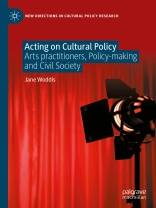This book investigates the role of arts practitioners in cultural policy-making, challenging the perception that arts practitioners have little or no involvement in policy and seeking to discover the extent and form of their engagement. Examining the subject through a case-study of playwriting policy in England since 1945, and paying particular attention to playwrights’ organisations and their history of self-directed activity, the book explores practitioners’ participation in cultural policy-making, encompassing both “invited” and “uninvited” interventions that also weave together policy activity and creative practice. It discusses why their involvement matters, and argues that arts practitioners and their organisations can be understood as participants in civil society whose policy activity contributes to the maintenance and enlargement of democratic practices and values.
Tabla de materias
Introduction: Spear-carriers or Speaking Parts?.- Chapter 1: Arts Practitioners in Cultural Policy Research.- Chapter 2: A Brief History of Arts Practitioners in the Policy Process in Britain.- Chapter 3: A Framework for Participation: the Concept of Civil Society.- Chapter 4: Theatre Writing Policy in England Since 1945.- Chapter 5: Playwrights and Theatre Companies: New Playwriting Practice and Policy.- Chapter 6: New Playwriting: Networks of Policy and Practice.- Chapter 7: Conclusion: Putting Theatre Practitioners in the Spotlight
Sobre el autor
Jane Woddis has worked professionally in the arts for many years and is an Associate Fellow in the Centre for Cultural and Media Policy Studies, University of Warwick, UK. She is co-editor of Artists’ Narratives in Cultural Policy and Management Research, a special issue of the Journal of Cultural Management and Cultural Policy (2022).












